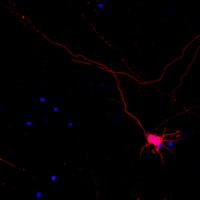Pancreatic beta cells express two autoantigenic forms of glutamic acid decarboxylase, a 65-kDa hydrophilic form and a 64-kDa amphiphilic form which can be both membrane-bound and soluble.
Christgau, S, et al.
J. Biol. Chem., 266: 21257-64 (1991)
1991
Show Abstract
The 64-kDa pancreatic beta-cell autoantigen, which is a target of autoantibodies associated with early as well as progressive stages of beta-cell destruction, resulting in insulin-dependent diabetes (IDDM) in humans, has been identified as the gamma-aminobutyric acid-synthesizing enzyme glutamic acid decarboxylase. We have identified two autoantigenic forms of this protein in rat pancreatic beta-cells, a Mr 65,000 (GAD65) hydrophilic and soluble form of pI 6.9-7.1 and a Mr 64,000 (GAD64) component of pI 6.7. GAD64 is more abundant than GAD65 and has three distinct forms with regard to cellular compartment and hydrophobicity. A major portion of GAD64 is hydrophobic and firmly membrane-anchored and can only be released from membrane fractions by detergent. A second portion is hydrophobic but soluble or of a low membrane avidity, and a third minor portion is soluble and hydrophilic. All the GAD64 forms have identical pI and mobility on sodium dodecyl sulfate-polyacrylamide gel electrophoresis. Results of pulse-chase labeling with [35S]methionine are consistent with GAD64 being synthesized as a soluble protein that is processed into a firmly membrane-anchored form in a process which involves increases in hydrophobicity but no detectable changes in size or charge. All the GAD64 forms can be resolved into two isoforms, alpha and beta, which differ by approximately 1 kDa in mobility on sodium dodecyl sulfate-polyacrylamide gel electrophoresis but are identical with regard to all other parameters analyzed in this study. GAD65 has a shorter half-life than the GAD64 forms, remains hydrophilic and soluble, and does not resolve into isomers. Comparative analysis of the brain and beta-cell forms of GAD show that GAD65 and GAD64 in pancreatic beta-cells correspond to the larger and smaller forms of GAD in brain, respectively. The expression of different forms and the flexibility in subcellular localization of the GAD autoantigen in beta-cells may have implications for both its function and autoantigenicity. | 1939164
 |












